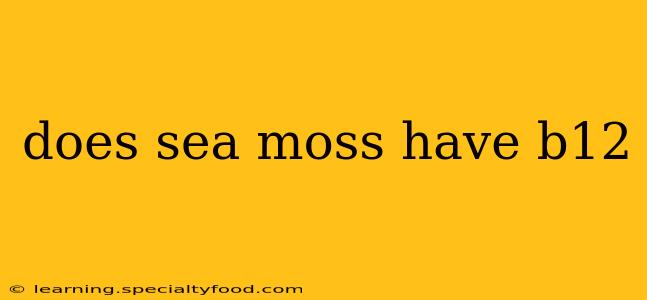Sea moss, a type of red seaweed also known as Irish moss, has gained significant popularity as a nutritional supplement. Many tout its purported health benefits, often emphasizing its rich mineral content. A frequent question surrounding sea moss is whether it contains vitamin B12. The short answer is: yes, sea moss contains some vitamin B12, but likely not enough to meet daily needs. Let's delve deeper into this complex topic.
How Much B12 is in Sea Moss?
The amount of vitamin B12 in sea moss is a subject of ongoing research and debate. While sea moss does contain some B12, the quantity is generally considered low and highly variable depending on factors like the species of seaweed, growing conditions, and processing methods. The bioavailability of the B12 present is also questionable. This means that even if B12 is present, your body may not efficiently absorb and utilize it. Many sources claim significant levels of B12, but these claims lack strong scientific backing. More research is needed to definitively quantify the amount of bioavailable B12 in sea moss.
Is the B12 in Sea Moss Enough to Meet Daily Requirements?
No, the amount of B12 found in sea moss is generally insufficient to meet the recommended daily intake for most adults. The recommended daily allowance (RDA) for vitamin B12 varies depending on age and health conditions, but generally ranges from 2.4 mcg to 2.8 mcg. While some studies might report trace amounts of B12 in sea moss, these quantities fall far short of meeting this daily requirement. Relying solely on sea moss for your B12 intake is therefore not advisable.
What are the best sources of vitamin B12?
For reliable and sufficient B12, it's essential to consume foods naturally rich in this vitamin, or consider a supplement. Excellent sources of vitamin B12 include:
- Animal products: Meat, poultry, fish, eggs, and dairy products are excellent sources of B12.
- Fortified foods: Many plant-based milks, cereals, and nutritional yeasts are fortified with B12 to cater to vegan and vegetarian diets.
- Supplements: B12 supplements are readily available and a safe and effective way to ensure adequate intake, particularly for individuals who follow plant-based diets or have conditions that affect B12 absorption.
Are there any other vitamins and minerals in sea moss?
While the B12 content of sea moss might be insufficient to meet daily needs, it's important to recognize its other nutritional benefits. Sea moss is a good source of various minerals, including:
- Iodine: Crucial for thyroid function.
- Potassium: Essential for maintaining fluid balance and blood pressure.
- Magnesium: Involved in numerous bodily processes, including muscle function and energy production.
However, always remember to consume sea moss in moderation and as part of a balanced diet. Overconsumption can lead to an excess of certain minerals, potentially causing health problems.
Can Sea Moss Cause B12 Deficiency?
Sea moss itself cannot directly cause a B12 deficiency. However, relying solely on sea moss as a source of B12, while neglecting other B12-rich foods or supplements, could contribute to a deficiency if your daily intake remains insufficient. It’s crucial to prioritize diverse nutrition to ensure a balanced intake of all essential vitamins and minerals.
Conclusion: Sea Moss and B12 – A Balanced Perspective
Sea moss contains some vitamin B12, but the amount is too low to be a reliable source for meeting daily needs. It's a valuable food with other nutritional benefits, but individuals should not depend on it as their primary source of vitamin B12. For optimal B12 levels, prioritize diverse dietary choices, including animal products, fortified foods, or supplements as needed. Remember to always consult with a healthcare professional or registered dietitian before making significant changes to your diet, especially if you have any underlying health conditions.
